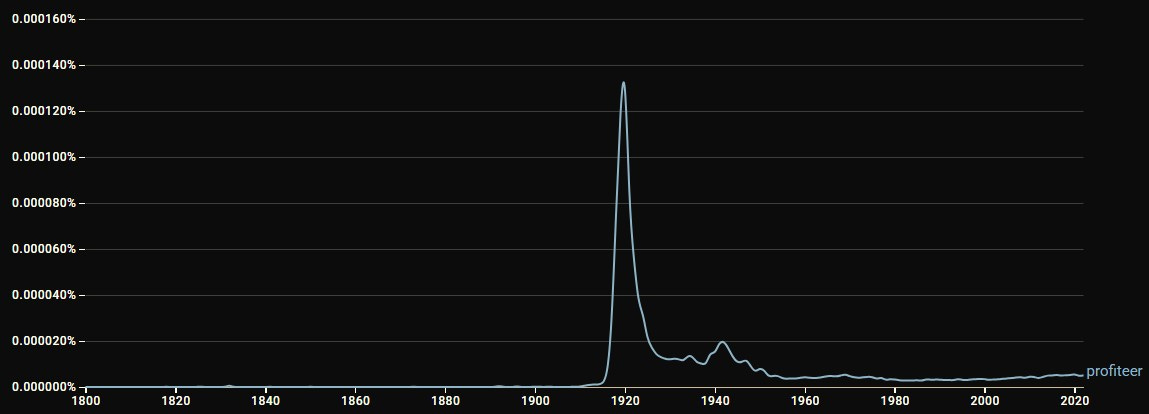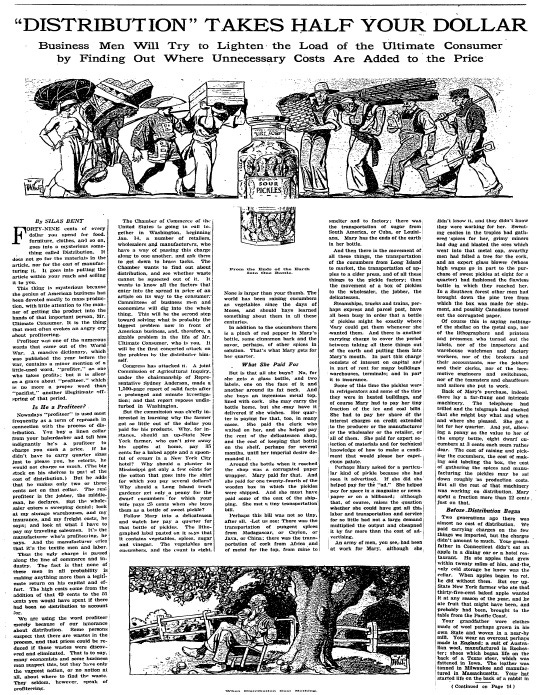"Distribution" Takes Half Your Dollar
The word "profiteer" was increasing in popularity, noted a January 1925 New York Times Magazine article. According to Google Books, the word was used far far far more in the 1920s – particularly the first half of that decade – than any time before or since.
As journalist Silas Bent wrote in 1925:
Profiteer was one of the numerous words that came out of the World War. A massive dictionary, which was published the year before the war, contains a minor mention of a little-used word, "profiter," as one who takes profits; but it is silent as a grave about "profiteer."
Nowadays "profiteer" is used most frequently as a term of reproach in connection with the process of distribution.
In fact, one could say the word "profiteer" was used frequently just in general. Google Books Ngram Viewer, which tracks the use of words or phrases in published books over time, finds that the word was leaps and bounds more popular during the first half of the 1920s than any other period:

(The actual peak year was 1920, five years before that article's 1925 publication.)
The 1925 article went on to call the phenomenon of profiteering "probably the biggest problem now in front of American business."
Well, a century later, that problem hasn't exactly been solved. In some ways, it's worse. Just in recent weeks, a prominent murder renewed attention to what many on the left consider perhaps the biggest "profiteering" of all: the very concept of private health insurance, which (largely) didn't even exist circa 1925.
Indeed, employer-sponsored health insurance mostly emerged nearly two decades after that 1925 article, when businesses added it as a perk amid World War II-era wage caps. In particular, the concept took off after a 1943 War Labor Board decision that health insurance benefits would be tax-free.
The issue has received renewed attention in recent weeks with Luigi Mangione's alleged murder of UnitedHealthcare CEO Brian Thompson. In particular, Mangione gained something of a "folk hero" status from many corners, particularly from people bankrupt due to medical debt or whose medical claims had been denied.
As Bent noted in 1925, the very concept of "profiteering" was a relatively recent development at the time, due to industrialization, advances in transportation, and the rise of nationwide commerce:
Two generations ago there was almost no cost of distribution. We paid carrying charges on the few things we imported, but the charges didn't amount to much.
Your grandfather in Connecticut didn't eat an apple in a dining car or a hotel restaurant. He ate apples that grew within twenty miles of him, and the only cold storage he knew was the cellar. When apples began to rot, he did without them. But our upstate New York farmer who ate that thirty-five-cent baked apple wanted it at any season of the year. And he ate fruit that might have been, and probably had been, brought to the table from the Pacific Coast.
To some extent, a consequence of free market capitalism – with its seemingly boundless choices and options for consumers – is bound to be at least some marginal level of what many might call "profiteering." But I'm typing this on a computer right now, a device which almost certainly would never have even been invented at all under any other economic system.
As the expression goes: there's no way to transfer money except in a leaky bucket.
"Distribution" Takes Half Your Dollar: Business Men Will Try to Lighten the Load of the Ultimate Consumer by Finding Out Where Unnecessary Costs Are Added to the Price
Published: Sunday, January 11, 1925


